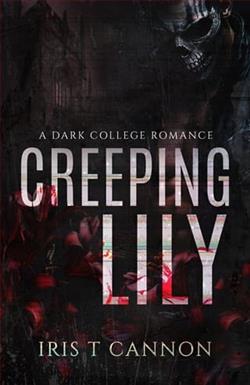Page 15 of Jailer to the Death God
“You can’t kill my servants,” I tell Arawn. “You were brought here to save life, not take it.”
“Nothing in our bargain prevents me from taking a life if I so choose. Except yours. I’m not allowed to take your life, more’s the pity. If you were to die by accident, though—”
“But I almost did,” I remind him. “I nearly fell into the Pit. You could have let me die, but you didn’t.”
“I had a moment of idiocy,” he growls.
“Hm.” A tiny spot of light winks to life deep in my chest, and in the vast darkness that my heart has become, its heat is addictive as the sun itself. I am ravenously desperate for more of that light, whatever it is—hope, humor, surprise—I can’t tell anymore. I am entirely numb and blank, except for that one speck of living, quivering brightness.
I’m watching Arawn, and he’s looking at me, until suddenly he snarls and lunges out of the carriage.
“Quiet!” I hiss, snatching the ritual book and clambering out after him. “We have to sneak you inside. I don’t want anyone asking me why I was snuggling with a bare-chested stranger in my coach while my people sicken and starve.”
“We were notsnuggling,” he says haughtily. “You toppled against me. Just as you toppled into the Pit. You should really control yourself better.”
“Shut up and get inside.” I push both palms against his bare back, while one of my bodyguards holds open the door to the West Tower. The guard is practically hiding behind the door as Arawn stalks through it.
“First you slap me, now you push me,” grumbles Arawn. “I should punish you for those assaults.”
I shiver slightly—the cold, perhaps, or fear. “I’ll have someone prepare a room for you to sleep in. Until then, you’ll wait in my chambers.”
We pause at the wash station just inside the tower. Other stations like it occupy every entrance into the palace. I’ve had the plague already, so I can no longer carry it or be infected by it, and neither can my guards; so we need not go through the deep cleansing rituals that the uninfected endure every time they leave or return. But we wash our hands and faces anyway, out of habit.
I’m glad to be rid of the blood on my hands. But my cloak is still flecked with it.
The plague is a wicked thing. It travels through air, clings to skin and breath. By some mercy it cannot be transferred on clothing or objects—at least, we don’t believe it can. But it’s in the air, carried on the wind, and there is no effective defense against such pervasive contagion.
The solitary advantage to most of the palace staff being ill, dead, or overworked is that the hallways are empty and quiet. I’m able to hustle Arawn upstairs to the royal wing of the palace without anyone noticing except another pair of guards, who seem too weary to care.
Farley is still with the horses, but the other servant who accompanied me, Tilda, is following us, trailing behind my two bodyguards. I pause for a moment and fall back to speak with her.
Tilda isn’t a talkative sort, and she doesn’t seem to have many friends among the other servants, which is one reason I brought her along to the summoning. She’s less likely to gossip about what she witnessed in the depths of the old forest.
“You must be very confused and frightened,” I say, low. “Are you all right?”
“A little frightened, Your Majesty, but not confused,” she says. “I understand why you’ve done this. But I’m worried for you. He is dangerous.”
She nods ahead, toward the broad back of Arawn. He’s so much taller than my bodyguards, and his shoulders are immense. When he walks, the muscles of his back surge and shift in the most distracting way. I have the strangest desire to know how those surging muscles would feel under my palms.
“Dangerous,” I repeat absently. “Of course he is.”
“But you don’t seem to feel it as the rest of us do.” She shoots me a quick sideways glance. “The way you speak to him—and you struck him in the face! He looked so angry, I thought he would kill you for that. My lady, please, please be careful. We need you. If anything happened to you—”
“Then the Council would appoint a new ruler,” I assure her, and I almost addperhaps one better qualified than I am. But I don’t say it aloud. A queen shouldn’t voice her self-doubt to those who rely on her.
“I’ll be careful,” I say. “But I must ask you again to keep this a secret, Tilda. No one must know who he really is. If anyone asks, he’s a healer from a foreign land who heard of our plight and came to help us. Let’s call him Vaughn. We’ll say he comes from—” I wrack my brain, trying to think of some far-off land we know little about—some dark place with magic— “Terelaus. Yes, that will do. Vaughn from Terelaus.”
“Yes, Your Majesty.” Tilda stumbles a little, and I read in her sagging shoulders the same weariness I feel.
“Go on to your quarters and get some sleep,” I tell her.
“But your bed, Majesty—I don’t know if anyone has changed it since the Lady Leilani rested there. It’s soiled, I’m sure. I will check it, and—”
“To bed,” I say firmly. “I can change my own sheets for once. Go, now. Your queen commands you to rest. And you two—” I raise my voice, speaking to my bodyguards. “Find a couple of other guards to watch my room tonight. You’ve done enough labor today. If anyone asks where we went this afternoon, you were helping me retrieve the new healer, Vaughn of Terelaus.”
“Vaughn of who?” says one of the guards blankly.
The other guard cuffs his companion’s shoulder and nods toward the death god, who has stopped walking and is standing with his arms crossed, glowering at us all.















